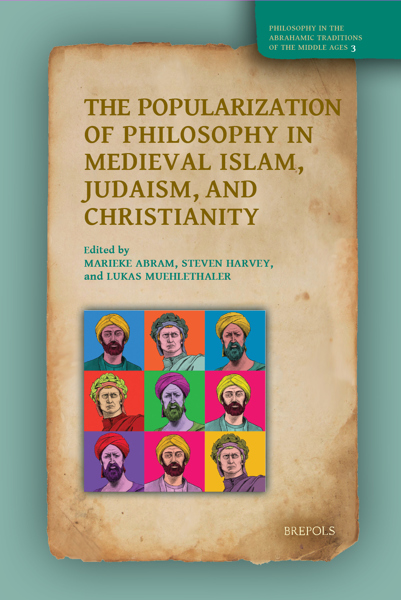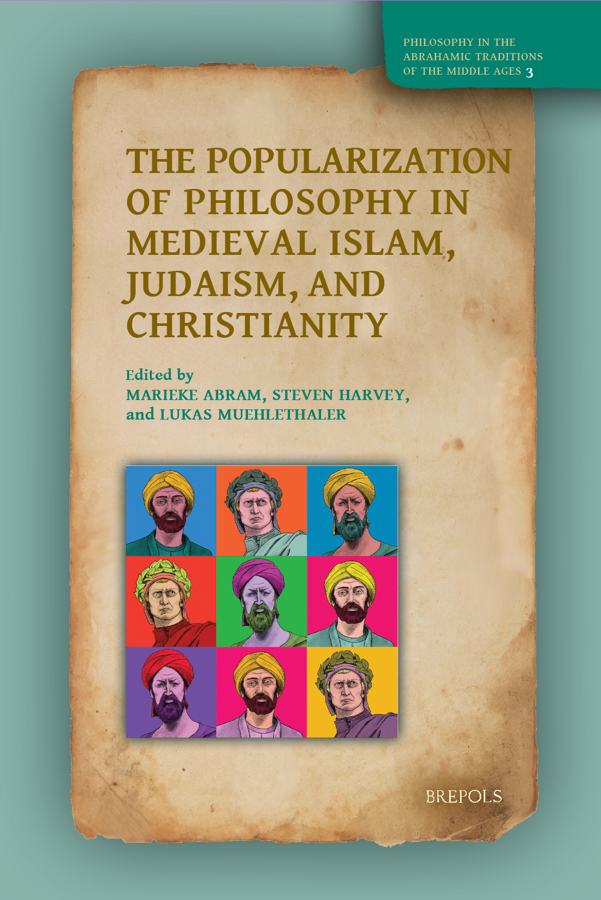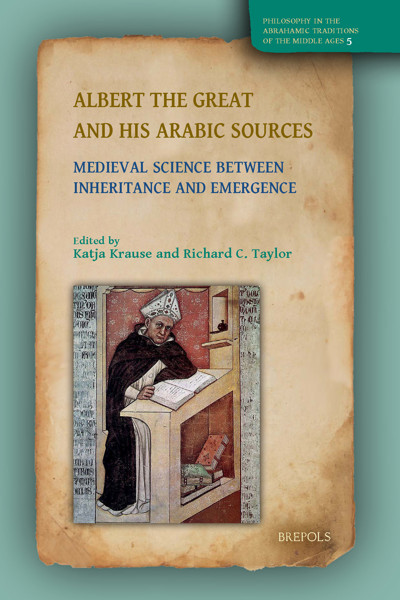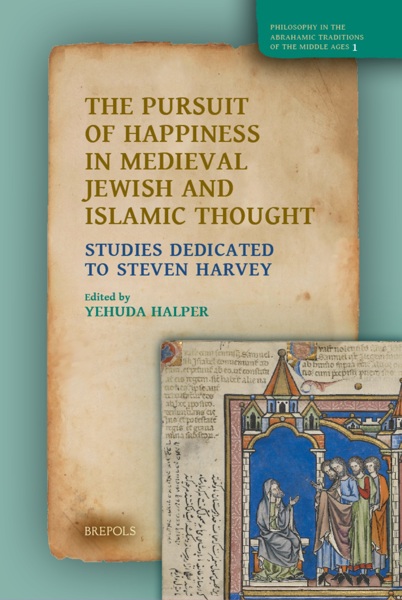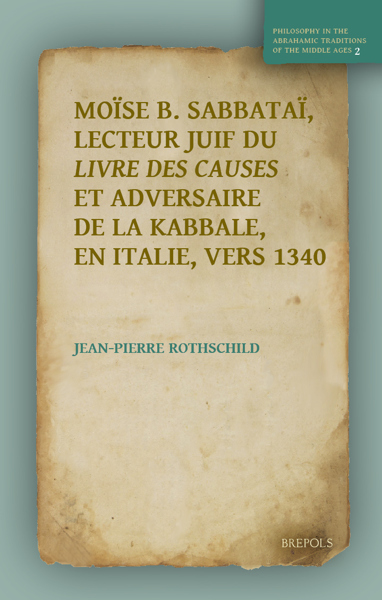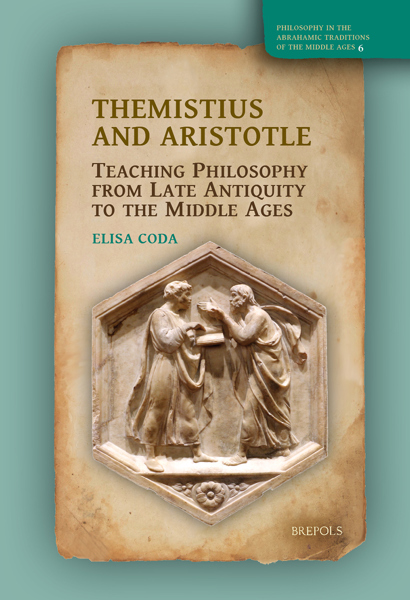
The Popularization of Philosophy in Medieval Islam, Judaism, and Christianity
Marieke Abram, Steven Harvey, Lukas Muehlethaler (eds)
- Pages: 465 p.
- Size:156 x 234 mm
- Language(s):English, Arabic, Hebrew
- Publication Year:2022
- € 120,00 EXCL. VAT RETAIL PRICE
- ISBN: 978-2-503-57783-8
- Hardback
- Available
- € 120,00 EXCL. VAT RETAIL PRICE
- ISBN: 978-2-503-57784-5
- E-book
- Available
This pioneering volume is the first of its kind to bring together scholars of medieval Islamic, Jewish, and Christian thought to discuss the popularization of philosophy in these three religious traditions of philosophy.
“The volume will be of interest to specialists in the field who will welcome the case studies as well as the well-conceived effort to think systematically about what it may have meant to popularize what is perceived to be an elitist tradition. Specialists in adjacent fields will appreciate the opportunity to explore the relationship between different truth regimes, and those who teach these texts will find strategies to make unfamiliar texts a little more familiar to new readers.” (Anna Akaso, in Church History, December 2023, p. 970)
"...The volume is rich enough in material and broad enough in scope to prompt future explorations of the popularization of philosophy in medieval times. (...) This volume demonstrates what is becoming more and more obvious: there is massive potential in moving away from towering figures and toward other agents (and processes in general) to understand how philosophy works in the real world—then and now". (Yoav Meyrav, in Speculum, 100/2, 2025, p. 499)
"No doubt, this is a highly stimulating book." (Luis Xavier López-Farjeat, dans Revue des sciences religieuses, 99/1-2, 2025, p. 268)
« (...) l’étude de R. M. Díaz Burillo constitue donc une assise solide pour les philologues. Plus largement, pour les études lucaniennes de réception, l’ouvrage constitue une étude minutieuse des traces de la diffusion du Bellum ciuile dans la péninsule ibérique, qui permet d’allier noms de possesseurs et état(s) du texte de Lucain. Enfin, pour l’histoire des textes anciens, l’étude constitue un modèle, y compris sur le plan méthodologique, qui pourra inspirer d’autres recherches similaires sur des auteurs à la tradition manuscrite et imprimée vivace. Pour l’ensemble de ces raisons, nous recommandons donc la lecture de cet ouvrage. » (Florian Barrière, dans Latomus, 84/1, 2025, p. 163)
Marieke Abram (PhD, University of Freiburg, 2017) is a Research Fellow at the University of Freiburg in the DFG-project ‘Making Mysticism’. In addition, she offers philosophical counselling and mediation at Hypatia CMP.
Steven Harvey (PhD, Harvard University, 1977) is Professor Emeritus of Medieval Islamic and Jewish Philosophy at Bar-Ilan University. He is President of the Commission for Jewish Philosophy of the S.I.E.P.M.
Lukas Muehlethaler (PhD, Yale University, 2010) is Professor for Jewish Philosophy and Aesthetics at Freie Universität Berlin. His research focuses on Jewish intellectual history in the Islamicate world and its modern reception.
This volume explores attempts at the popularization of philosophy and natural science in medieval Islam, Judaism, and Christianity. Medieval philosophers usually wrote their philosophical books for philosophers, so the desire to convey psychological, cosmological, metaphysical, or even physical teachings to the ‘vulgus’ may seem surprising. This disdain for the multitude and their weak intellectual capabilities is expressed most clearly in the medieval Islamic and Jewish Aristotelian traditions of philosophy, but is certainly found among the Scholastics as well. Yet philosophy was taught to non-philosophers and via a variety of literary genres. Indeed, scholars have argued that philosophy most influenced medieval society through popular forms of transmission. Among the questions this volume addresses are the following: Which philosophers or theologians sought to direct their philosophical writings to the many? For what purposes did they seek to popularize philosophy? Was the goal to teach philosophical truths? Were certain teachings not transmitted? Which teachings were transmitted most often? For whom exactly were these popularized texts written? Were the authors of popularized philosophy always aware they were writing for non-philosophers? How did they go about teaching philosophy to a wide audience? How successful were these attempts? In what ways did popularized philosophy impact upon society? To what extent were the considerations and problems in the medieval popularization of philosophy the same or different in the various religious traditions of philosophy? How philosophical was the popularized philosophy?
In addressing these questions, this pioneering volume is the first of its kind to bring together scholars of medieval Islamic, Jewish, and Christian thought to discuss the popularization of philosophy in these three religious traditions of philosophy.
General Introduction — Marieke Abram and Steven Harvey
PART I: INTRODUCTORY REMARKS
1. Philosophy as Literature: Appraisal, Defence, and Satire of Rational Thought in Classical Arabic Poetry and Prose — Gerhard Endress
2. Broadening the Audience for Philosophy Among Medieval Jews — Charles H. Manekin
3. Popularization of Philosophy in the Latin West: The Philosophical Opportunities of Popularization — John Marenbon
PART II: POPULARIZATION OF PHILOSOPHY VIA THE MEDIEVAL ENCYCLOPEDIAS
4. Introduction — Steven Harvey
5. Anonymous Philosophical Compendia: An Attempt at Vulgarization? — Elvira Wakelnig
6. Levels of Philosophical Sophistication in Medieval Hebrew Encyclopedias of Philosophy and Science — Resianne Fontaine
7. The Summa dictorum: A Theological-Philosophical Encyclopedia for Monks — Guy Guldentops
PART III: POPULARIZATION OF PHILOSOPHY VIA BOOKS OF INSTRUCTION
8. Introduction — Sarah Stroumsa
9. Between Popularity and Marginality: al-Baṭalyawsī’s Book of Imaginary Circles — Ayala Eliyahu
10. Ruaḥ Ḥen: An Early Popular Hebrew Introduction to Science — Ofer Elior
11. Medieval Philosophy of Nature Popularised? Albert the Great’s De animalibus — Katja Krause
PART IV: POPULARIZATION OF PHILOSOPHY VIA MYSTICAL LITERATURE
12. Introduction — Yossef Schwartz
13. Popularization of Philosophy in the Sufi Milieu: The Reception of Avicenna’s Doctrine of the Origination of the Human Soul in ʿAyn al-Quḍāt al-Hamadānī’s Writings — Salimeh Maghsoudlou
14. Myth and Metaphysics: The Popularization of Platonic and Neo-Platonic Motifs through Kabbalistic Theosophy — Tanja Werthmann
15. Popularized Philosophy in Hendrik Herp’s Mystical Guide, the Spieghel der volcomenheit — Marieke Abram
PART V: POPULARIZATION OF PHILOSOPHY VIA SCRIPTURAL EXEGESIS AND SERMONS
16. Introduction — Howard Kreisel
17. The Conception of Philosophical Problems in Fakhr al-Dīn al-Rāzī’s Qurʾān Commentary (Mafātīḥ al-ghayb) and the Popularization of Philosophy — Lukas Muehlethaler
18. Fifteenth-Century Synagogue Sermons — Chaim Meir Neria
19. Approaching Wisdom: The ‘Anonymous of Tegernsee’ and his Translation of Bernard’s Sermones super Cantica Canticorum — Lydia Wegener
PART VI: POPULARIZATION OF PHILOSOPHY VIA POETRY
20. Introduction — Anne Eusterschulte
21. Intellectual Poetry in the Medieval Islamicate World: Verse and the Popularization of Philosophical Knowledge — M. A. Mujeeb Khan
22. The Road to Hell is Paved with Good Philosophers: The Ladder of Knowledge in Immanuel of Rome’s Hell and Heaven — Yehuda Halper
23. ‘Donna gentile’: Philosophy in and around the Vita nuova — Myrtha de Meo-Ehlert
PART VII: CONCLUDING REFLECTIONS
24. Religious Critique as a Popularization of Philosophy — Frank Griffel
25. Jewish Averroists contra the Popularization of Philosophy: The Case of the Philosophists — Shalom Sadik
26. Popular Philosophy is the True Philosophy — Warren Zev Harvey
27. The Modern Popularization of Medieval Philosophy — Peter Adamson
28. Some Remarks on Vulgarization of Philosophy in the Middle Ages — Loris Sturlese
INDICES
Index of Names, Ancient and Premodern
Index of Names, Modern and Contemporary
Index of Books, Ancient and Premodern
Index of Subjects
